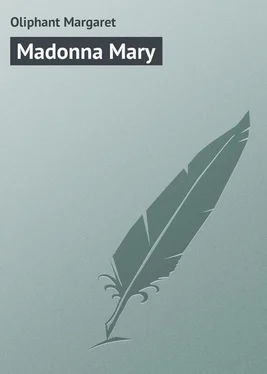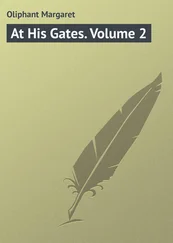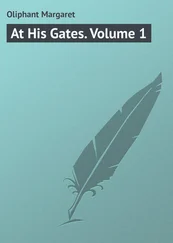Margaret Oliphant - Madonna Mary
Здесь есть возможность читать онлайн «Margaret Oliphant - Madonna Mary» — ознакомительный отрывок электронной книги совершенно бесплатно, а после прочтения отрывка купить полную версию. В некоторых случаях можно слушать аудио, скачать через торрент в формате fb2 и присутствует краткое содержание. Жанр: foreign_prose, на английском языке. Описание произведения, (предисловие) а так же отзывы посетителей доступны на портале библиотеки ЛибКат.
- Название:Madonna Mary
- Автор:
- Жанр:
- Год:неизвестен
- ISBN:нет данных
- Рейтинг книги:4 / 5. Голосов: 1
-
Избранное:Добавить в избранное
- Отзывы:
-
Ваша оценка:
- 80
- 1
- 2
- 3
- 4
- 5
Madonna Mary: краткое содержание, описание и аннотация
Предлагаем к чтению аннотацию, описание, краткое содержание или предисловие (зависит от того, что написал сам автор книги «Madonna Mary»). Если вы не нашли необходимую информацию о книге — напишите в комментариях, мы постараемся отыскать её.
Madonna Mary — читать онлайн ознакомительный отрывок
Ниже представлен текст книги, разбитый по страницам. Система сохранения места последней прочитанной страницы, позволяет с удобством читать онлайн бесплатно книгу «Madonna Mary», без необходимости каждый раз заново искать на чём Вы остановились. Поставьте закладку, и сможете в любой момент перейти на страницу, на которой закончили чтение.
Интервал:
Закладка:
“It could never have happened to me,” said Miss Sorbette, with sudden wrath; which was a fortunate diversion for Mr. Churchill. This was how her friends discussed her after Mary had gone away from her second wedding; and perhaps they were harder upon her than she had supposed even in her secret thoughts.
CHAPTER V
BUT the worst of all to Mrs. Ochterlony was that little Hugh had been there – Hugh, who was six years old, and so intelligent for his age. The child was very anxious to know what it meant, and why she knelt by his father’s side while all the other people were standing. Was it something particular they were praying for, which Mrs. Kirkman, and the rest did not want? Mary satisfied him as she best could, and by-and-by he forgot, and began to play with his little brother as usual; but his mother knew that so strange a scene could not fail to leave some impression. She sat by herself that long day, avoiding her husband for perhaps the first time in her life, and imagining a hundred possibilities to herself. It seemed to her as if everybody who ever heard of her henceforth must hear of this, and as if she must go through the world with a continual doubt upon her; and Mary’s weakness was to prize fair reputation and spotless honour above everything in the world. Perhaps Mrs. Kirkman was not so far wrong after all, and there was a higher meaning in the unlooked-for blow that thus struck her at her tenderest point; but that was an idea she could not receive. She could not think that God had anything to do with her husband’s foolish restlessness, and her own impatient submission. It was a great deal more like a malicious devil’s work, than anything a beneficent providence could have arranged. This way of thinking was far from bringing Mary any consolation or solace, but still there was a certain reasonableness in her thoughts. And then an indistinct foreboding of harm to her children, she did not know what, or how to be brought about, weighed upon Mary’s mind. She kept looking at them as they played beside her, and thinking how, in the far future, the meaning of that scene he had been a witness to might flash into Hugh’s mind when he was a man, and throw a bewildering doubt upon his mother’s name, which perhaps she might not be living to clear up; and these ideas stung her like a nest of serpents, each waking up and darting its venom to her heart at a separate moment. She had been very sad and very sorry many a time before in her life, – she had tasted all the usual sufferings of humanity; and yet she had never been what may be called unhappy , tortured from within and without, dissatisfied with herself and everything about her. Major Ochterlony was in every sense of the word a good husband, and he had been Mary’s support and true companion in all her previous troubles. He might be absurd now and then, but he never was anything but kind and tender and sympathetic, as was the nature of the man. But the special feature of this misfortune was that it irritated and set her in arms against him, that it separated her from her closest friend and all her friends, and that it made even the sight and thought of her children, a pain to her among all her other pains.
This was the wretched way in which Mary spent the day of her second wedding. Naturally, Major Ochterlony brought people in with him to lunch (probably it should be written tiffin, but our readers will accept the generic word), and was himself in the gayest spirits, and insisted upon champagne, though he knew they could not afford it. “We ate our real wedding breakfast all by ourselves in that villanous little place at Gretna,” he said, with a boy’s enthusiasm, “and had trout out of the Solway: don’t you recollect, Mary? Such trout! What a couple of happy young fools we were; and if every Gretna Green marriage turned out like mine!” the Major added, looking at his wife with beaming eyes. She had been terribly wounded by his hand, and was suffering secret torture, and was full of the irritation of pain; and yet she could not so steel her heart as not to feel a momentary softening at sight of the love and content in his eyes. But though he loved her he had sacrificed all her scruples, and thrown a shadow upon her honour, and filled her heart with bitterness, to satisfy an unreasonable fancy of his own, and give peace, as he said, to his mind. All this was very natural, but in the pain of the moment it seemed almost inconceivable to Mary, who was obliged to conceal her mortification and suffering, and minister to her guests as she was wont to do, without making any show of the shadow that she felt to have fallen upon her life.
It was, however, tacitly agreed by the ladies of the station to make no difference, according to the example of the Colonel’s wife. Mrs. Kirkman had resolved upon that charitable course from the highest motives, but the others were perhaps less elevated in their principles of conduct. Mrs. Hesketh, who was quite a worldly-minded woman, concluded it would be absurd for one to take any step unless they all did, and that on the whole, whatever were the rights of it, Mary could be no worse than she had been for all the long time they had known her. As for Miss Sorbette, who was strong-minded, she was disposed to consider that the moral courage the Ochterlonys had displayed in putting an end to an unsatisfactory state of affairs merited public appreciation. Little Mrs. Askell, for her part, rushed headlong as soon as she heard of it, which fortunately was not till it was all over, to see her suffering protectress. Perhaps it was at that moment, for the first time, that the ensign’s wife felt the full benefit of being a married lady, able to stand up for her friend and stretch a small wing of championship over her. She rushed into Mrs. Ochterlony’s presence and arms like a little tempest, and cried and sobbed and uttered inarticulate exclamations on her friend’s shoulder, to Mary’s great surprise, who thought something had happened to her. Fortunately the little eighteen-year-old matron, after the first incoherence was over, began to find out that Mrs. Ochterlony looked the same as ever, and that nothing tragical could have happened, and so restrained the offer of her own countenance and support, which would have been more humbling to Mary than all the desertion in the world.
“What is the matter, my dear?” said Mrs. Ochterlony, who had regained her serene looks, though not her composed mind; and little Irish Emma, looking at her, was struck with such a sense of her own absurdity and temerity and ridiculous pretensions, that she very nearly broke down again.
“I’ve been quarrelling with Charlie,” the quick-witted girl said, with the best grace she could, and added in her mind a secret clause to soften down the fiction, – “he is so aggravating; and when I saw my Madonna looking so sweet and so still – ”
“Hush!” said Mary “there was no need for crying about that – nor for telling fibs either,” she added, with a smile that went to the heart of the ensign’s wife. “You see there is nothing the matter with me,” Mrs. Ochterlony added; but notwithstanding her perfect composure it was in a harder tone.
“I never expected anything else,” said the impetuous little woman; “as if any nonsense could do any harm to you! And I love the Major, and I always have stood up for him; but oh, I should just like for once to box his ears.”
“Hush!” said Mary again; and then the need she had of sympathy prompted her for one moment to descend to the level of the little girl beside her, who was all sympathy and no criticism, which Mary knew to be a kind of friendship wonderfully uncommon in this world. “It did me no harm,” she said, feeling a certain relief in dropping her reserve, and making visible the one thing of which they were both thinking, and which had no need of being identified by name. “It did me no harm, and it pleased him. I don’t deny that it hurt at the time,” Mary added after a little pause, with a smile; “but that is all over now. You need not cry over me, my dear.”
Читать дальшеИнтервал:
Закладка:
Похожие книги на «Madonna Mary»
Представляем Вашему вниманию похожие книги на «Madonna Mary» списком для выбора. Мы отобрали схожую по названию и смыслу литературу в надежде предоставить читателям больше вариантов отыскать новые, интересные, ещё непрочитанные произведения.
Обсуждение, отзывы о книге «Madonna Mary» и просто собственные мнения читателей. Оставьте ваши комментарии, напишите, что Вы думаете о произведении, его смысле или главных героях. Укажите что конкретно понравилось, а что нет, и почему Вы так считаете.












